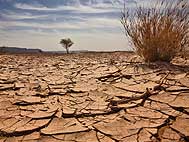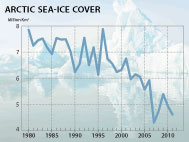| SEARCH |
-

Nov 17, 2015
Reflections on a three-decade legacy
The International Geosphere-Biosphere Programme (IGBP) will come to a close at t...
-
Nov 17, 2015
Use of and access to content on this website
Text and images produced by IGBP in house are free to use with appropriate credi...
-
Nov 12, 2015
Bella Gaia performance and panel discussion to mark IGBP's closure
A musical performance by Bella Gaia will celebrate the achievements and legacy o...
-

Towards Future Earth:
evolution or revolution?
During its three decades of existence, the International Geosphere-Biosphere Pro...
-
A personal note on IGBP and the social sciences
Humans are an integral component of the Earth system as conceptualised by IGBP. João Morais recalls key milestones in IGBP’s engagement with the social sciences and offers some words of advice for Future Earth.
-
IGBP and Earth observation:
a co-evolution
The iconic images of Earth beamed back by the earliest spacecraft helped to galvanise interest in our planet’s environment. The subsequent evolution and development of satellites for Earth observation has been intricately linked with that of IGBP and other global-change research programmes, write Jack Kaye and Cat Downy .
-
Deltas at risk
Around 500 million people worldwide live on deltas, but many of the world's deltas are sinking due ...
-
Climate change: the state of the science
A new data visualization released on the first day of the plenary negotiations at the UNFCCC’s clima...
-
Climate Change:
the State of the Science
Videos now online from the Stockholm public forum to mark the launch of the IPCC's climate report, 2...

photo: iStockphoto/Daniel Sambraus
Research and projects
IGBP science is the study of the Earth system, in particular the interactions between biological, chemical, physical and human systems.
Core projects
IGBP has 12 major international projects (including 4 joint projects coordinated by the Earth System Science Partnership). Each project has an international project office (IPO). Several projects also have satellite offices - "nodal offices" - throughout the world.
- Analysis, Integration and Modelling of the Earth System (AIMES)
- Global Land Project (GLP)
- International Global Atmospheric Chemistry (IGAC)
- Integrated Land Ecosystem-Atmosphere Processes Study (iLEAPS)
- Integrated Marine Biogeochemistry and Ecosystem Research (IMBER)
- Land-Ocean Interaction in the Coastal Zone (LOICZ)
- Past Global Changes (PAGES)
- Surface Ocean—Lower Atmosphere Study (SOLAS)
Joint projects and studies
- Climate Change, Agriculture and Food Security (CCAFS)
- Global Carbon Project (GCP)
- Global Environmental Change and Human Health (GECHH)
- Global Water System Project (GWSP)
- Global Change System for Analysis, Research and Training (START) http://start.org/
- Monsoon Asia Integrated Regional Study (MAIRS)
Synthesis
In 2009, IGBP decided to synthesise knowledge about a series of policy-relevant topics.
- Earth-system impacts from changes in the cryosphere (Lead: Ray Bradley)
- Impacts from changes in the cryosphere on the biota and societies in the arid Central Asia (Lead: Qin Dahe)
- Megacities in the coastal zone (Lead: Mark Pelling)
- Global environmental change and sustainable development: needs of least developed countries
- Geoengineering impacts (Lead: Pauline Dube)
- Nitrogen and climate (Lead: Jan Willem Erisman)
- Impacts of land-use-induced land-cover changes on the functioning of the Earth System (Nathalie de Noblet and Peter Verburg)
- Air pollution and climate (Paul Monks and Kathy Law)
Major endorsed projects
- African Monsoon Multidisciplinary Analysis (AMMA)
- International Nitrogen Initiative (INI)
- Northern Eurasia Earth Science Partnership Initiative (NEESPI)
Recent Fast-Track Initiatives
We have run several Fast-Track Initiatives over the years. These were designed to reduce uncertainty in key areas of the Earth system or to develop new ideas or concepts. The most recent ones were:
IGBP closed at the end of 2015. This website is no longer updated.
-

Global Change Magazine No. 84
This final issue of the magazine takes stock of IGBP’s scientific and institutional accomplishments as well as its contributions to policy and capacity building. It features interviews of several past...
-

Global Change Magazine No. 83
This issue features a special section on carbon. You can read about peak greenhouse-gas emissions in China, the mitigation of black carbon emissions and the effect of the 2010-2011 La Niña event on gl...
RECOMMENDED
-
INTERGOVERNMENTAL PANEL ON CLIMATE CHANGE:
How green is my future?
UN panel foresees big growth in renewable energy, but policies will dictate just how big.
-
UK:
'The Anthropocene: a new epoch of geological time?'
Royal Society, Philosphical Transactions A




















